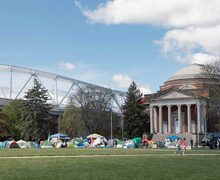Silence aims to build LGBT awareness
Sometimes silence can produce a deafening cry.
Members of the university community and local high school students will participate in several on-campus events today that coincide with the National Day of Silence, in which participants vow to remain silent all day.
The silence symbolizes the silencing of lesbian, gay, bisexual and transgender people in the United States on issues such as violence against gay men and lesbian women, and gay rights, said Patty Hayes, a graduate assistant at the LGBT Center, which is coordinating the event.
‘I think it’s very valuable to use silence paradoxically to speak loudly,’ Hayes said. ‘It’s a really active resistance.’
Participants from SU will join those from the Syracuse area and will gather for a Loud and Proud rally at 5:30 p.m. on the steps of Hendricks Chapel. The rally, designed to break the silence, will call for greater recognition of LGBT people in society, Hayes said.
The SU community has never before officially participated in the Day of Silence, which began in 1996 at the University of Virginia. Since then, thousands of students from high schools and colleges across the country have joined in the silent protest.
On the day of the event, participants will wear cards explaining the significance of their silence. Participants can pick up a card explaining their vow of silence for anyone wondering why they are not speaking at the LGBT Center.
Many straight allies of the LGBT community across the country participate in the protest, yet only a few have expressed an interest in SU’s events, said Jennifer Spinner, sophomore public policy and women’s studies major.
These allies, however, are crucial in helping to win gay rights and recognition, said Adrea L. Jaehnig, director of the LGBT Center.
‘I think it’s really important that straight students understand some of the challenges that LGBT students face,’ Jaehnig said. ‘(Homophobia) hurts straight people as well.’
Stereotypes of the gay and lesbian community carry over to the straight community, such as when peers harass a boy with feminine mannerisms because they perceive his behavior as a sign of being gay, Jaehnig said.
But if students have classes with other students who take the vow of silence, it might compel them to discuss the issues and consider their own opinions, Spinner said, who helped coordinate the event.
‘As long as straight people don’t think of it as an issue, the silence will continue,’ said Claudia Klaver, an assistant English professor at SU who identifies as lesbian. ‘Sexuality is part of one’s identity that can be easily ignored because it is not physically apparent. Because you can ignore the category (of sexuality), you can ignore the issues.’
The laws prohibiting discrimination against gays and lesbians will work to change society’s overall attitude toward the gay and lesbian community, but only if people follow those laws, Jaehnig said.
‘People have to comply with the law,’ Jaehnig said. ‘My hopes are greater than compliance.’
Published on April 20, 2004 at 12:00 pm




